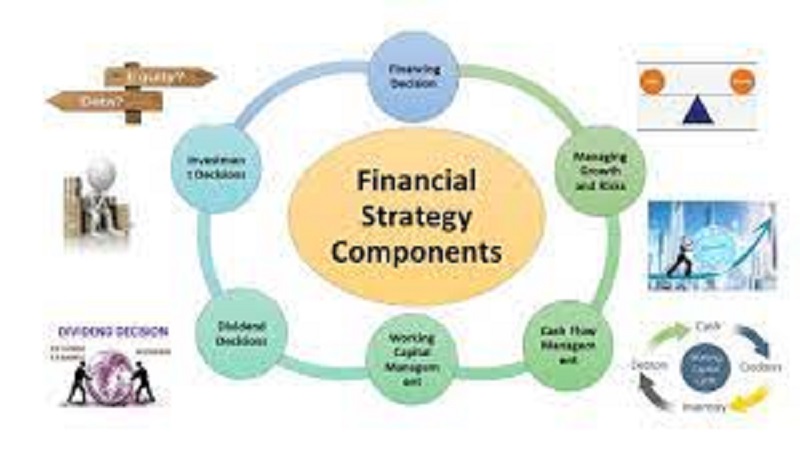Latest News on Our Blog

Developing Your Financing Strategy for Business Expansion
Expanding a business can be a pivotal moment in its growth trajectory, presenting exciting opportunities and potential challenges. Whether it's scaling operations, entering new markets, or launching innovative products, one of the most critical aspects of successful expansion is developing a sound financing strategy. Crafting a well-thought-out plan to secure the necessary capital can make all the difference in turning expansion dreams into a thriving reality.
-
Assessing Financial Needs: The first step in developing a financing strategy is a comprehensive assessment of the financial requirements for the expansion. Carefully evaluate the costs involved in scaling the business, such as infrastructure, equipment, marketing, and human resources. By gaining a clear understanding of the capital needed, businesses can avoid underestimating expenses and ensure their strategy aligns with the expansion's scope.
-
Reviewing Internal Resources: Before seeking external funding, it is essential to review internal resources and explore if existing cash reserves or profits can be allocated towards the expansion. Utilizing retained earnings or reinvesting profits can reduce the reliance on external financing and provide a foundation for a stronger balance sheet. Leveraging internal resources responsibly can also demonstrate the company's financial stability to potential investors or lenders.
-
Identifying Suitable Financing Options: Different expansion initiatives may require distinct financing solutions. It is crucial to explore various financing options available to the business, such as traditional bank loans, lines of credit, venture capital, angel investors, private equity, or crowdfunding. Each option comes with its pros and cons, and the chosen method should align with the company's financial situation, risk tolerance, and growth objectives.
-
Building Strong Financial Projections: Accurate financial projections are vital to securing financing for expansion. Investors and lenders need to see a clear and compelling business case with detailed revenue forecasts, expense estimates, and cash flow projections. Solid financial projections instill confidence in stakeholders and demonstrate that the expansion plan is grounded in realism and data-driven decision-making.
-
Strengthening Business Credit: A strong credit profile is essential when seeking external financing. Businesses should ensure their credit history is accurate and up-to-date. Timely repayment of existing loans and obligations can help improve the credit score and increase the likelihood of securing favorable financing terms for expansion.
-
Establishing a Solid Business Plan: A well-structured and comprehensive business plan is a key asset when approaching potential investors or lenders. The plan should clearly articulate the expansion strategy, market analysis, competitive positioning, operational plans, and risk assessment. A strong business plan showcases the company's potential and serves as a roadmap for the expansion journey.
-
Mitigating Risks: Expansion inherently involves risks, and stakeholders are keen to know how businesses plan to address potential challenges. A robust financing strategy should include risk mitigation measures, contingency plans, and stress testing scenarios. Demonstrating a proactive approach to risk management can instill confidence in potential investors and lenders.
-
Networking and Building Relationships: Establishing strong relationships with investors, lenders, and other potential financiers is crucial. Networking events, industry conferences, and business forums provide excellent opportunities to connect with potential partners who may be interested in supporting the expansion.
-
Seeking Professional Advice: Navigating the intricacies of financing can be challenging, especially for businesses embarking on their first expansion. Seeking advice from financial experts, accountants, or business consultants can provide valuable insights and guidance. These professionals can help assess the financial viability of the expansion plan, recommend appropriate financing options, and ensure compliance with financial regulations.
-
Negotiating Favorable Terms: When securing external financing, negotiating favorable terms is essential to optimize the benefits for the business. Carefully review the interest rates, repayment terms, collateral requirements, and any other conditions associated with the financing. Negotiating these terms can make a significant difference in the long-term financial health of the company.
-
Maintaining Transparent Communication: Open and transparent communication with stakeholders is key throughout the financing process. Investors and lenders appreciate honesty about the expansion's potential risks and challenges. Keeping them informed about progress, milestones achieved, and any changes in the expansion plan builds trust and fosters a positive relationship.
-
Diversifying Funding Sources: Relying on a single source for financing can expose the business to higher risks. To reduce this risk, consider diversifying funding sources by combining different types of financing or securing investments from multiple investors. Diversification can increase financial stability and flexibility during the expansion journey.
-
Evaluating the Impact on Existing Operations: Expanding a business can put strain on existing operations, affecting cash flow and resources. Businesses should carefully evaluate how the expansion will impact day-to-day operations and ensure that existing operations can accommodate the growth without compromising quality or customer satisfaction.
-
Monitoring and Adapting the Financing Strategy: A financing strategy is not set in stone; it should be regularly monitored and adapted as the expansion progresses. Assess whether the original projections are aligning with actual results and be prepared to make adjustments if needed. A flexible financing strategy allows businesses to respond to unforeseen challenges and seize new opportunities.
-
Celebrating Success and Learning from Failures: Once the financing strategy yields positive results, it is essential to celebrate milestones achieved and recognize the efforts of the team. Additionally, businesses should embrace failures as learning opportunities and use them to refine future expansion endeavors.
In conclusion, developing a financing strategy for business expansion requires careful planning, evaluation, and proactive engagement with potential investors or lenders. By following these steps and incorporating a growth-oriented mindset, businesses can set themselves on a path to successful expansion and long-term prosperity. Remember that the journey may have ups and downs, but a well-executed financing strategy can be the key to turning expansion aspirations into tangible achievements.



